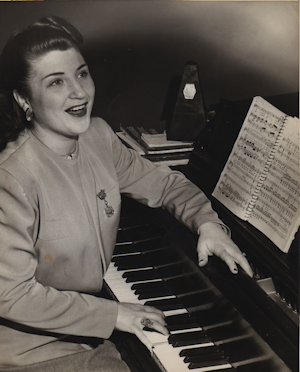Margery Mayer (Steen’s) first experience teaching voice was to undergraduates at Luther College during the 1947-48 academic year, where her husband, Sigvart J. Steen, a conductor of choirs and band, had been appointed Chairman of the Department of Music. After moving to New York City in 1949, she continued as an instructor in voice at Wagner College. By 1961 Mayer was promoted to assistant professor and subsequently granted tenure in the Music Department where she taught until the spring of 1977. Over the typical two to four year window, in one-on-one weekly lessons, Miss Mayer helped many Wagner College undergraduates gain an appreciation for art song and opera literature as she instructed them in the fundamentals of voice production.

Margery Mayer – Teaching Students to Sing
Photo: Staten Island Advance, 1951
For beginning voice students, especially young, often shy, undergraduates, the process of cultivating a healthy and expressive technique was closely related to the students’ readiness to release inhibitions. Recalling her own journey to become vocally proficient and emotionally confident, Miss Mayer’s teaching approach alternated patient encouragement with occasional prodding to reach for a new plateau, often deflecting self conscious tensions by using herself to demonstrate a technique or posture. Weekly one-on-one instruction consisted of studying the fundamentals of vocal physiology, forming the voice through repeated vocalise patterns to extend range and flexibility and the study of songs, arias and foreign language pronunciation. In addition there were periodic informal recitals in which students performed for each other to build confidence and the poise to really communicate with an audience.
Margery Mayer believed it was vital for young singers to have regular performing opportunities recalling the maturing effect that her nationwide tours with San Carlo Opera and regular radio broadcast opportunities had in solidifying her singing technique and confidence. She organized periodic informal recitals to underscore the benefit of regular performance including supportive feedback from peers.
An early member of the National Association of Teachers for Singing, and ardent supporter of training and standards for vocal teachers, she attended NATS annual meetings by the early 1960’s. This initiated a period where Miss Mayer immersed herself in self-study to understand the emerging scientific research of the time and the diverse approaches to pedagogy of voice training represented in new works by William Vennard, D. Ralph Appelman, Burton Coffin and others. She regularly incorporated her new learning into her voice lesson curriculum.
However, her techniques for developing the voices of her students remained firmly grounded in the innate understanding of her own voice. She practiced vocalises daily which she had learned by rote from her first and only voice teacher, the Viennese born Zerlina Muhlman Metzler who also wrote a small but very thought provoking guide to singing entitled: Individual Voice Patterns: A Reflection Book.
Of more than 500 students under her tutelage during her Wagner years, she identified and challenged many talented students to sing and perform to the best of their abilities. Many went on to enjoy singing as an avocation and source of enrichment throughout their lives. She was passionate about one-on-one coaching believing her contribution––teaching the basics and instilling confidence––would blossom over time, particularly for those who persevered.
As if passing the torch from her mentor, Mary Garden, to the next generation, two of her most talented students won Fulbright Fellowships: One relocating permanently to Europe, and the other receiving acclaim for her leading role performances at the Metropolitan, La Scala and San Francisco Opera Companies before transitioning to become a stage director and opera company general manager.
Miss Mayer also developed a very popular course in opera appreciation at Wagner, which was enhanced by guest lectures from renowned New York City artists, in-class opera scene demonstrations, trips to opera performances in Manhattan as well as Mayer’s vivid stories from her ‘behind the curtain’ perspective.
Miss Mayer retired from Wagner in 1977 after 28 years of teaching and moved with her husband, George Voutsas, to Carmel Highlands, California.
image sources
- Margery Mayer as voice teacher-2bw: Photo: Staten Island Advance